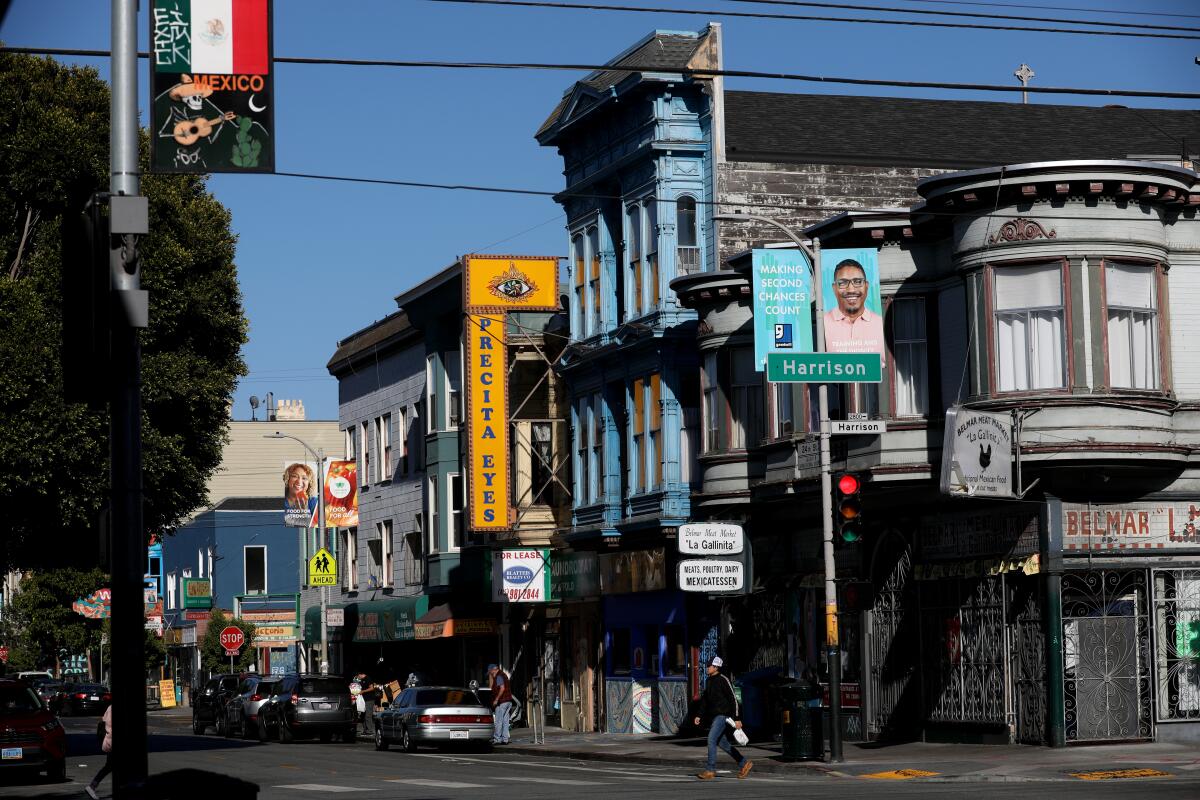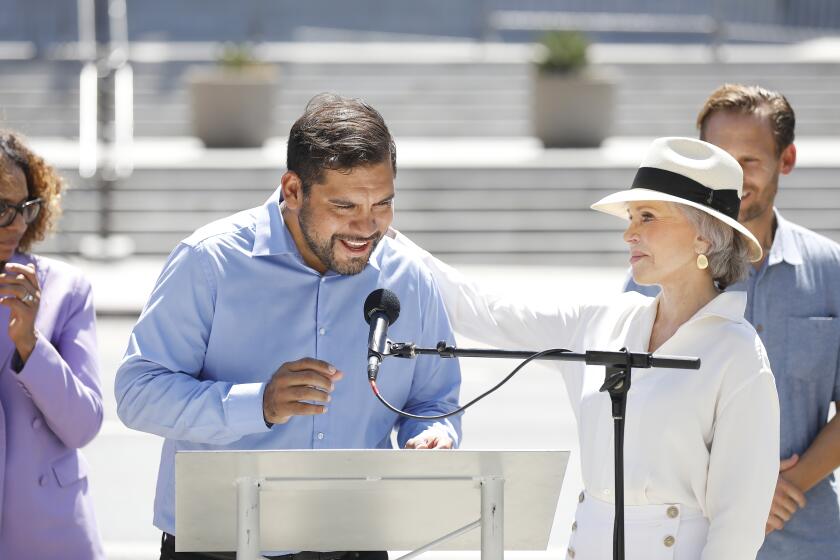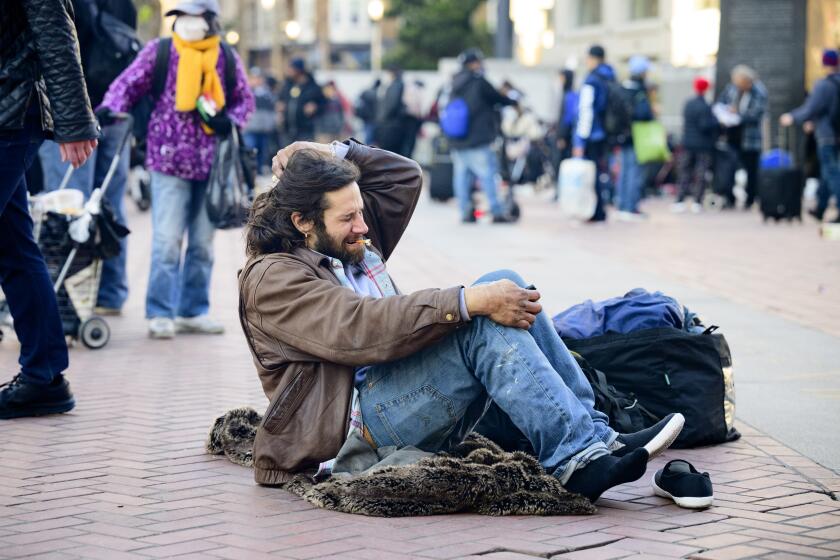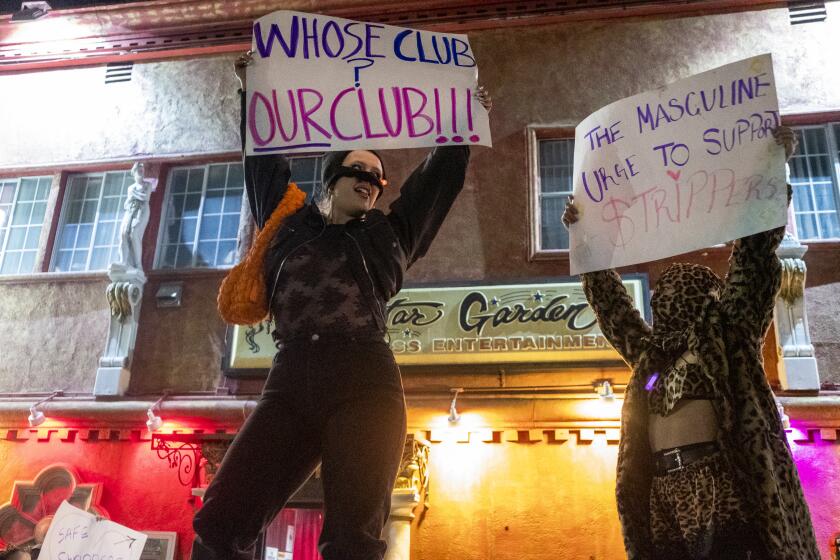Could a red-light district for sex work happen in San Francisco?

- Share via
As San Francisco prepares to block vehicle traffic from a stretch of the Mission District this month in an attempt to stifle street prostitution, the idea of creating a designated district for sex work is gaining traction among some advocates and officials.
A red-light district might not be a far-fetched concept in the Mission, where many residents say sex workers have been present for decades.
Though San Francisco has not taken any official action on a red-light zone, officials are having water barriers and other barricades installed on Capp Street in response to recent complaints about what county Supervisor Hillary Ronen called a “cruising zone,” according to the San Francisco Chronicle. The stretch of Capp between 18th and 22nd streets will be closed to vehicles except for those of residents.
Motorcycle officers will patrol the area and issue traffic citations in an effort to deter people from searching for sex workers.
It’s unclear how long the barriers or police patrols will remain. The San Francisco Police Department did not respond to requests for more information.
The installation of the barriers has renewed discussion of a designated area where sex workers could operate without being criminalized and of how to address concerns about human trafficking.
Ronen, who represents the Mission, told the Chronicle that she would support a red-light zone, but that figuring out the legal hurdles and location would be challenging.
The leak triggered another exchange between Soto-Martinez, a sharp critic of the LAPD, and the union that represents rank-and-file police officers.
But she hopes to introduce a resolution to the San Francisco County Board of Supervisors on Tuesday that would act as an official request to California lawmakers to decriminalize sex work.
“What’s happening right now on Capp Street is it’s become more brazen, and bigger than we’ve ever seen it before,” Ronen told The Times on Wednesday.
“Instead of repeating the same cycle that we’ve repeated for decades, it’s time to try something new,” she said.
The idea of decriminalizing sex work is not as radical as it might have been when Ronen took office in 2017, she said.
“I don’t think this is going to happen tomorrow. This would be a major change in policy and direction,” said Ronen, a licensed attorney. “I certainly won’t be the first person to try to urge the legalization of prostitution, and I won’t be the last.”
Celestina Pearl, outreach director for the nonprofit St. James Infirmary, which provides resources to sex workers, welcomes the idea of a red-light district, but said there is a critical component that needs to be taken into consideration.
“I feel like the important thing is to get the actual voices of sex workers involved,” Pearl told The Times. “Are they talking about forming a red-light district and then pushing for decriminalization? Or possibly simultaneously? Or prioritizing the criminalization? These are all the possibilities. The future is happening very quickly.”
San Francisco opened a semi-legal safe drug consumption site, then shut it months later with no real plans for another, as the fentanyl crisis grows.
A group of anonymous residents told ABC affiliate KGO-TV that drivers line Capp Street until 3 a.m. in search of sex workers. They also said crime had gotten worse in the last few months.
Santiago Lerma, a legislative aide with Ronen’s office, told the news outlet Mission Local that there was a resurgence in sex workers as people started to emerge from the pandemic.
Pastor James Amado of the San Francisco Tabernacle Seventh-day Adventist Church near Capp and 22nd said sex workers had been on Capp Street since he first started attending the church more than 20 years ago.
“Capp Street is like the main street for them to flock to,” Amado told The Times, referring to the sex workers. “I’ve seen them every night. These ladies start to walk around in front of the church.”
Amado said he had seen johns and sex workers try to use the church parking lot when he leaves it unlocked at night during weekly church meetings.
“It’s been going on in this neighborhood for a long time, and I can feel the sentiment with the people who live in the neighborhood,” he said.
San Francisco Dist. Atty. Brooke Jenkins said her office had been in contact with Capp Street residents.
She visited the neighborhood on a weeknight “to better understand their concerns and determine how [to] be helpful in addressing the prostitution and human trafficking concerns, while working to support victims,” she said in a written statement.
The National Labor Relations Board found merit to allegations that Star Garden violated labor law when it fired three employees and locked out 15 others.
Clients who are cited for solicitation are referred to neighborhood courts for adjudication and are expected to abide by the agreements they make, including going to “john school and pledging to not repeat their behavior,” according to Jenkins.
Since she took office last year, 14 johns have been referred to neighborhood court, she said.
“We also do everything we can to help rescue victims from traffickers. We are prepared to prosecute any … traffickers where there is sufficient evidence for us to move forward,” the statement said.
Pearl, with St. James Infirmary, said that although there are likely instances of sex trafficking, not all sex workers on the street are victims.
Anita O’Shea, operations director with St. James Infirmary, said street barriers on Capp Street would not be a permanent solution.
“It’s not going to change the fact that sex workers need to work to survive, to feed their families, to pay rent,” O’Shea told The Times. “If we want real solutions, we need to decriminalize sex work. And provide housing, job training, healthcare and other things to poor people.”
Twice a week, St. James hands out kits to sex workers that include hygiene packs, condoms and lubricant.
San Francisco’s planned crackdown in the Mission will only move the sex workers over to another street, O’Shea said.
Though it is clear that Capp Street residents are being exposed to violence and other hazards as men cruise in search of sex, O’Shea said, “we feel that the solution is not to sweep people away.”
More to Read
Sign up for Essential California
The most important California stories and recommendations in your inbox every morning.
You may occasionally receive promotional content from the Los Angeles Times.














